Leadership and Management: The Lanesborough Hotel Report
VerifiedAdded on 2022/11/24
|11
|3312
|122
Report
AI Summary
This report provides a comprehensive analysis of leadership and management principles within the service industry, using The Lanesborough Hotel as a practical example. The report begins with an introduction to leadership and management, followed by an examination of classical management theories and their implementation, including the contributions of Frederick Taylor, Henry Fayol, and Max Weber. It then defines the roles of leaders and explores different leadership styles, such as autocratic, democratic, and laissez-faire, assessing their suitability for the service sector. The report further investigates the internal and external factors influencing management styles and organizational structure, including workplace stress, culture, employee skills, customer relationships, and economic conditions. Additionally, it identifies and evaluates the hard and soft skills essential for effective leadership in the service industry. The report concludes with an overview of management and leadership skills required by the service sector, offering valuable insights into the practical application of leadership and management theories within a real-world context.
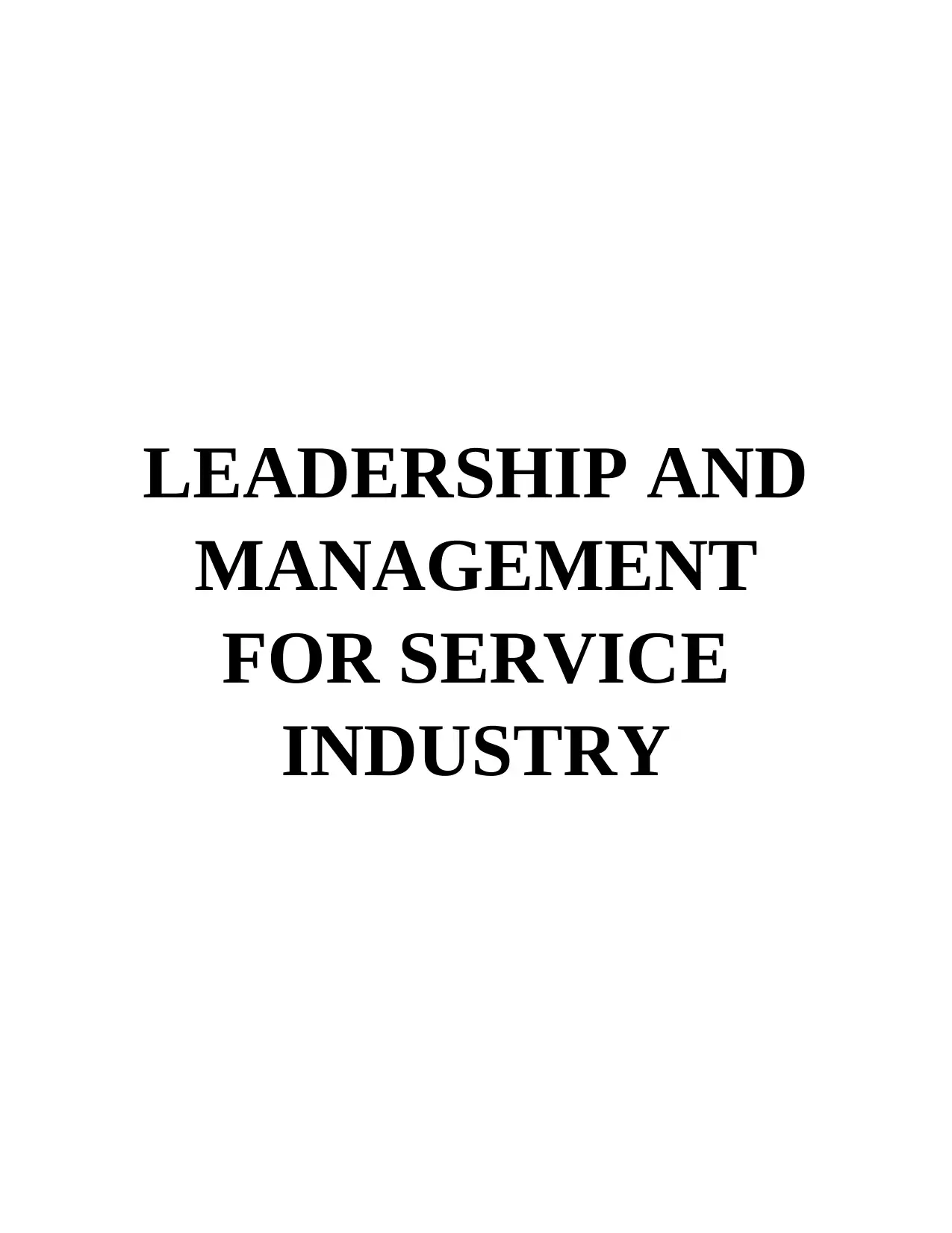
LEADERSHIP AND
MANAGEMENT
FOR SERVICE
INDUSTRY
MANAGEMENT
FOR SERVICE
INDUSTRY
Paraphrase This Document
Need a fresh take? Get an instant paraphrase of this document with our AI Paraphraser
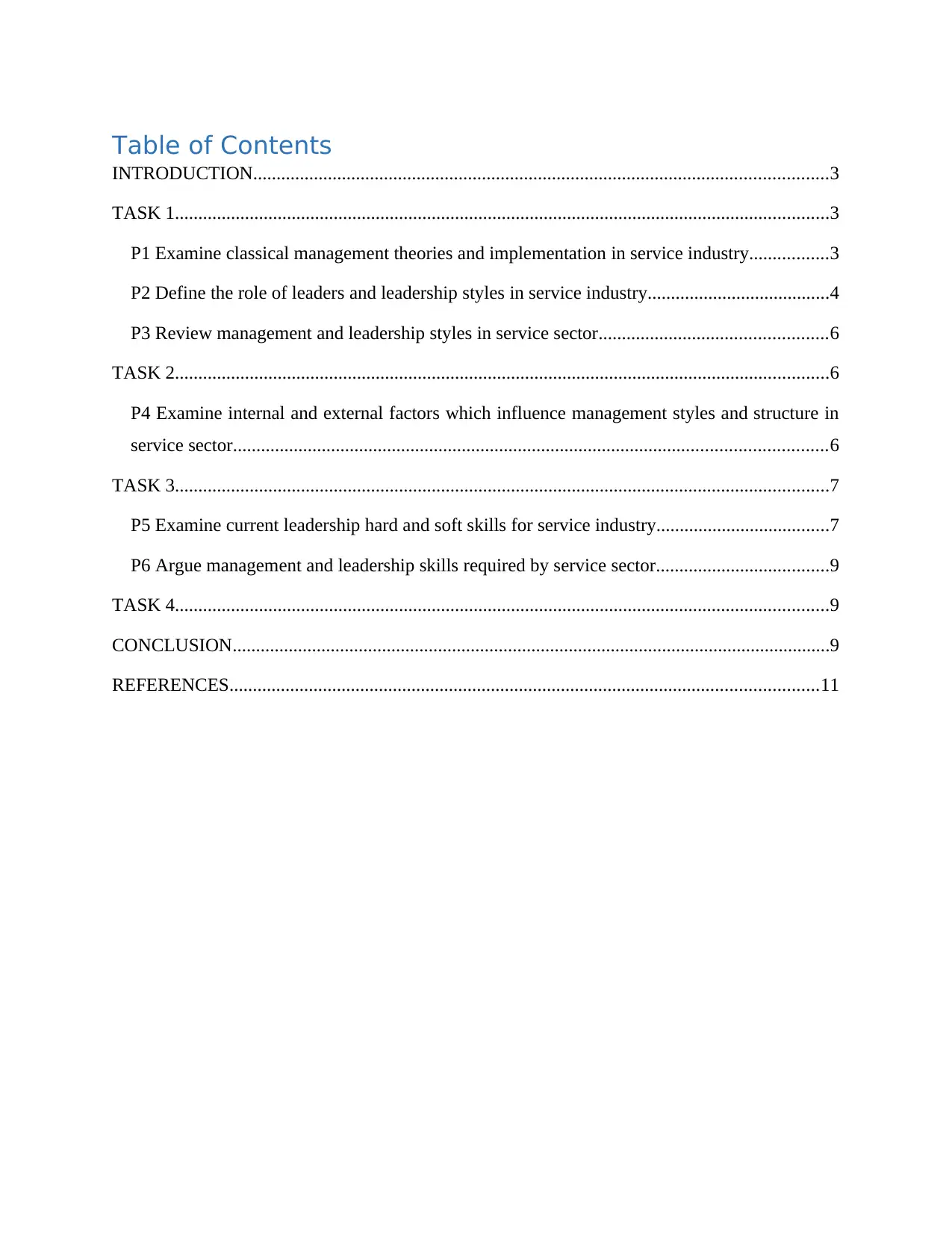
Table of Contents
INTRODUCTION...........................................................................................................................3
TASK 1............................................................................................................................................3
P1 Examine classical management theories and implementation in service industry.................3
P2 Define the role of leaders and leadership styles in service industry.......................................4
P3 Review management and leadership styles in service sector.................................................6
TASK 2............................................................................................................................................6
P4 Examine internal and external factors which influence management styles and structure in
service sector...............................................................................................................................6
TASK 3............................................................................................................................................7
P5 Examine current leadership hard and soft skills for service industry.....................................7
P6 Argue management and leadership skills required by service sector.....................................9
TASK 4............................................................................................................................................9
CONCLUSION................................................................................................................................9
REFERENCES..............................................................................................................................11
INTRODUCTION...........................................................................................................................3
TASK 1............................................................................................................................................3
P1 Examine classical management theories and implementation in service industry.................3
P2 Define the role of leaders and leadership styles in service industry.......................................4
P3 Review management and leadership styles in service sector.................................................6
TASK 2............................................................................................................................................6
P4 Examine internal and external factors which influence management styles and structure in
service sector...............................................................................................................................6
TASK 3............................................................................................................................................7
P5 Examine current leadership hard and soft skills for service industry.....................................7
P6 Argue management and leadership skills required by service sector.....................................9
TASK 4............................................................................................................................................9
CONCLUSION................................................................................................................................9
REFERENCES..............................................................................................................................11
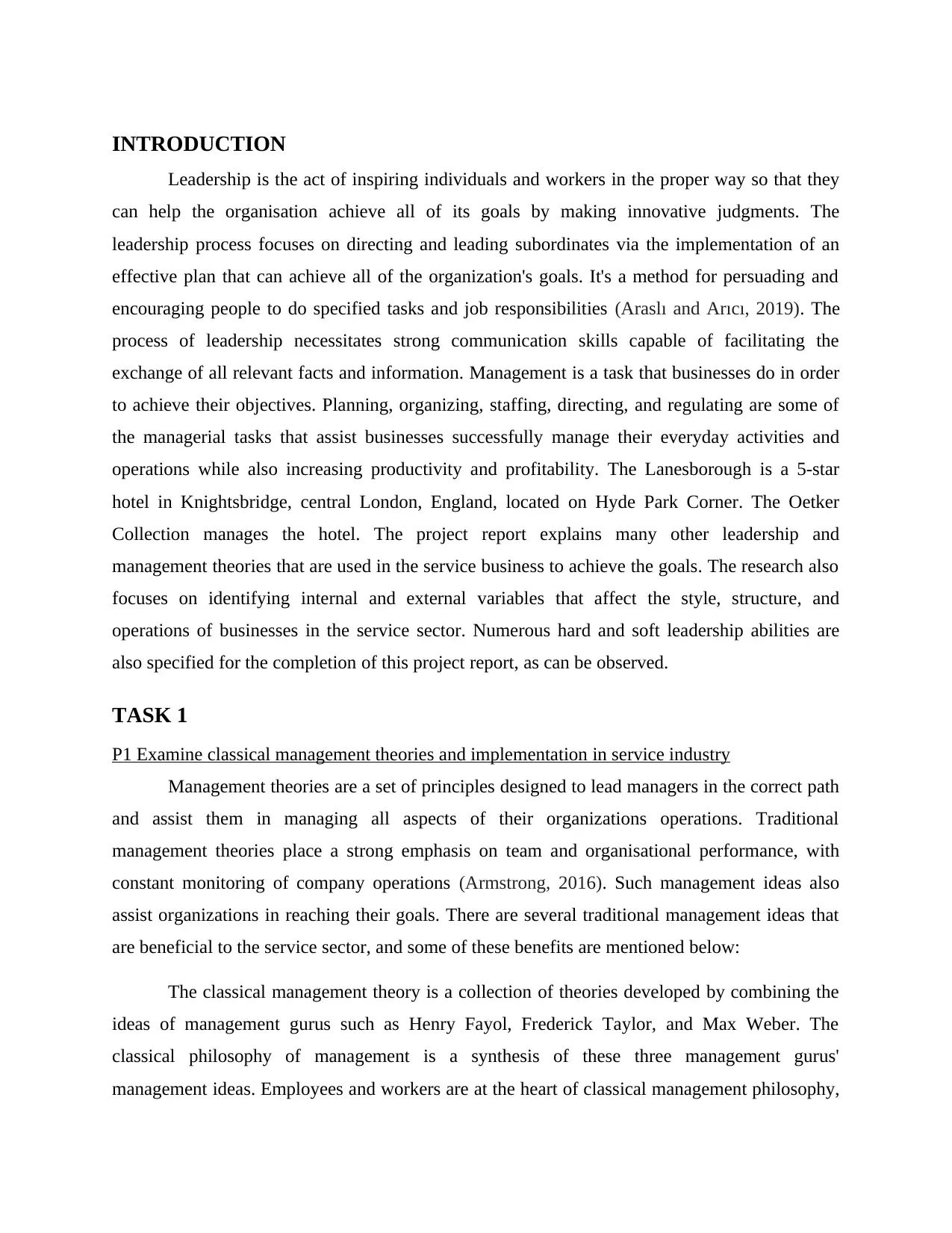
INTRODUCTION
Leadership is the act of inspiring individuals and workers in the proper way so that they
can help the organisation achieve all of its goals by making innovative judgments. The
leadership process focuses on directing and leading subordinates via the implementation of an
effective plan that can achieve all of the organization's goals. It's a method for persuading and
encouraging people to do specified tasks and job responsibilities (Araslı and Arıcı, 2019). The
process of leadership necessitates strong communication skills capable of facilitating the
exchange of all relevant facts and information. Management is a task that businesses do in order
to achieve their objectives. Planning, organizing, staffing, directing, and regulating are some of
the managerial tasks that assist businesses successfully manage their everyday activities and
operations while also increasing productivity and profitability. The Lanesborough is a 5-star
hotel in Knightsbridge, central London, England, located on Hyde Park Corner. The Oetker
Collection manages the hotel. The project report explains many other leadership and
management theories that are used in the service business to achieve the goals. The research also
focuses on identifying internal and external variables that affect the style, structure, and
operations of businesses in the service sector. Numerous hard and soft leadership abilities are
also specified for the completion of this project report, as can be observed.
TASK 1
P1 Examine classical management theories and implementation in service industry
Management theories are a set of principles designed to lead managers in the correct path
and assist them in managing all aspects of their organizations operations. Traditional
management theories place a strong emphasis on team and organisational performance, with
constant monitoring of company operations (Armstrong, 2016). Such management ideas also
assist organizations in reaching their goals. There are several traditional management ideas that
are beneficial to the service sector, and some of these benefits are mentioned below:
The classical management theory is a collection of theories developed by combining the
ideas of management gurus such as Henry Fayol, Frederick Taylor, and Max Weber. The
classical philosophy of management is a synthesis of these three management gurus'
management ideas. Employees and workers are at the heart of classical management philosophy,
Leadership is the act of inspiring individuals and workers in the proper way so that they
can help the organisation achieve all of its goals by making innovative judgments. The
leadership process focuses on directing and leading subordinates via the implementation of an
effective plan that can achieve all of the organization's goals. It's a method for persuading and
encouraging people to do specified tasks and job responsibilities (Araslı and Arıcı, 2019). The
process of leadership necessitates strong communication skills capable of facilitating the
exchange of all relevant facts and information. Management is a task that businesses do in order
to achieve their objectives. Planning, organizing, staffing, directing, and regulating are some of
the managerial tasks that assist businesses successfully manage their everyday activities and
operations while also increasing productivity and profitability. The Lanesborough is a 5-star
hotel in Knightsbridge, central London, England, located on Hyde Park Corner. The Oetker
Collection manages the hotel. The project report explains many other leadership and
management theories that are used in the service business to achieve the goals. The research also
focuses on identifying internal and external variables that affect the style, structure, and
operations of businesses in the service sector. Numerous hard and soft leadership abilities are
also specified for the completion of this project report, as can be observed.
TASK 1
P1 Examine classical management theories and implementation in service industry
Management theories are a set of principles designed to lead managers in the correct path
and assist them in managing all aspects of their organizations operations. Traditional
management theories place a strong emphasis on team and organisational performance, with
constant monitoring of company operations (Armstrong, 2016). Such management ideas also
assist organizations in reaching their goals. There are several traditional management ideas that
are beneficial to the service sector, and some of these benefits are mentioned below:
The classical management theory is a collection of theories developed by combining the
ideas of management gurus such as Henry Fayol, Frederick Taylor, and Max Weber. The
classical philosophy of management is a synthesis of these three management gurus'
management ideas. Employees and workers are at the heart of classical management philosophy,
⊘ This is a preview!⊘
Do you want full access?
Subscribe today to unlock all pages.

Trusted by 1+ million students worldwide
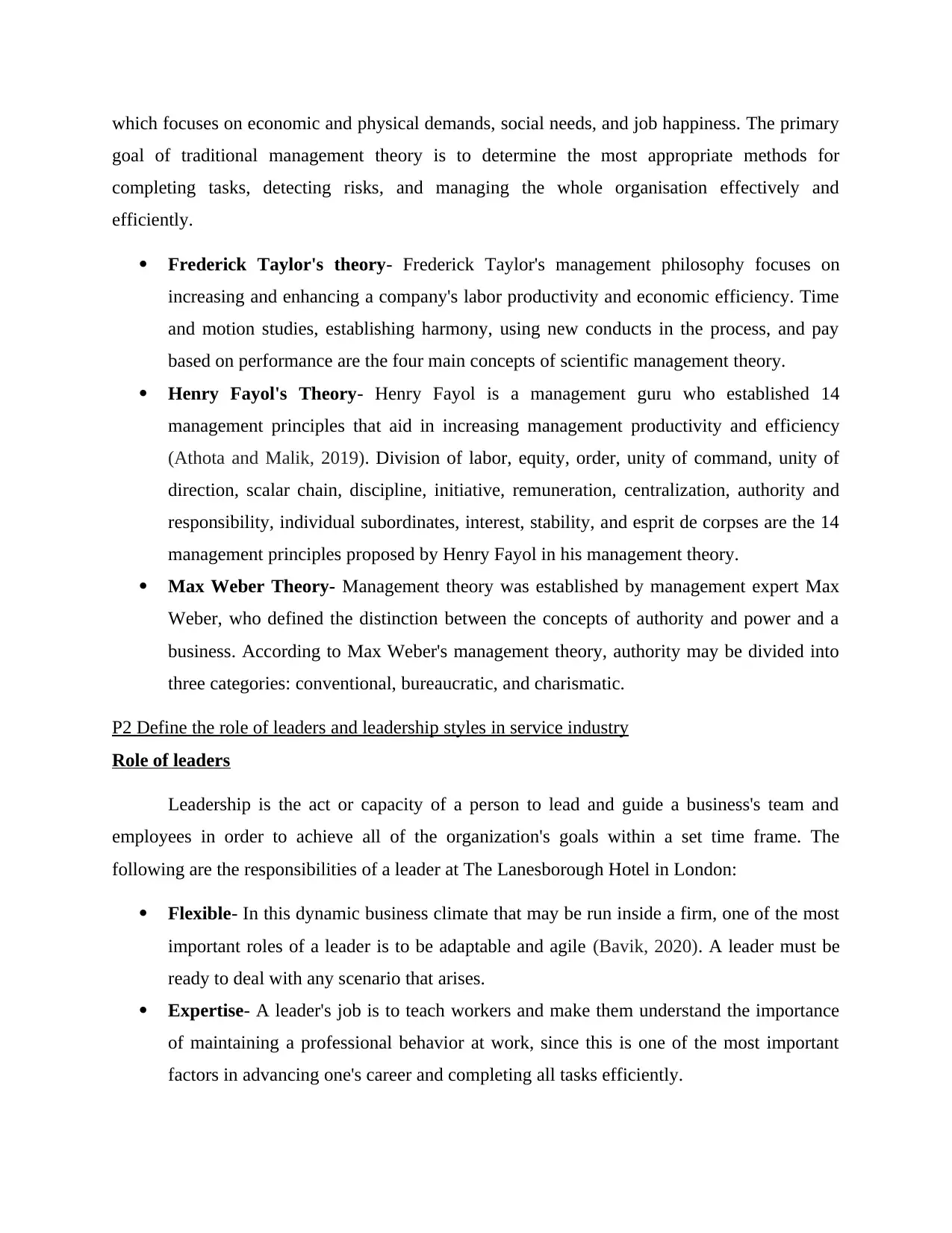
which focuses on economic and physical demands, social needs, and job happiness. The primary
goal of traditional management theory is to determine the most appropriate methods for
completing tasks, detecting risks, and managing the whole organisation effectively and
efficiently.
Frederick Taylor's theory- Frederick Taylor's management philosophy focuses on
increasing and enhancing a company's labor productivity and economic efficiency. Time
and motion studies, establishing harmony, using new conducts in the process, and pay
based on performance are the four main concepts of scientific management theory.
Henry Fayol's Theory- Henry Fayol is a management guru who established 14
management principles that aid in increasing management productivity and efficiency
(Athota and Malik, 2019). Division of labor, equity, order, unity of command, unity of
direction, scalar chain, discipline, initiative, remuneration, centralization, authority and
responsibility, individual subordinates, interest, stability, and esprit de corpses are the 14
management principles proposed by Henry Fayol in his management theory.
Max Weber Theory- Management theory was established by management expert Max
Weber, who defined the distinction between the concepts of authority and power and a
business. According to Max Weber's management theory, authority may be divided into
three categories: conventional, bureaucratic, and charismatic.
P2 Define the role of leaders and leadership styles in service industry
Role of leaders
Leadership is the act or capacity of a person to lead and guide a business's team and
employees in order to achieve all of the organization's goals within a set time frame. The
following are the responsibilities of a leader at The Lanesborough Hotel in London:
Flexible- In this dynamic business climate that may be run inside a firm, one of the most
important roles of a leader is to be adaptable and agile (Bavik, 2020). A leader must be
ready to deal with any scenario that arises.
Expertise- A leader's job is to teach workers and make them understand the importance
of maintaining a professional behavior at work, since this is one of the most important
factors in advancing one's career and completing all tasks efficiently.
goal of traditional management theory is to determine the most appropriate methods for
completing tasks, detecting risks, and managing the whole organisation effectively and
efficiently.
Frederick Taylor's theory- Frederick Taylor's management philosophy focuses on
increasing and enhancing a company's labor productivity and economic efficiency. Time
and motion studies, establishing harmony, using new conducts in the process, and pay
based on performance are the four main concepts of scientific management theory.
Henry Fayol's Theory- Henry Fayol is a management guru who established 14
management principles that aid in increasing management productivity and efficiency
(Athota and Malik, 2019). Division of labor, equity, order, unity of command, unity of
direction, scalar chain, discipline, initiative, remuneration, centralization, authority and
responsibility, individual subordinates, interest, stability, and esprit de corpses are the 14
management principles proposed by Henry Fayol in his management theory.
Max Weber Theory- Management theory was established by management expert Max
Weber, who defined the distinction between the concepts of authority and power and a
business. According to Max Weber's management theory, authority may be divided into
three categories: conventional, bureaucratic, and charismatic.
P2 Define the role of leaders and leadership styles in service industry
Role of leaders
Leadership is the act or capacity of a person to lead and guide a business's team and
employees in order to achieve all of the organization's goals within a set time frame. The
following are the responsibilities of a leader at The Lanesborough Hotel in London:
Flexible- In this dynamic business climate that may be run inside a firm, one of the most
important roles of a leader is to be adaptable and agile (Bavik, 2020). A leader must be
ready to deal with any scenario that arises.
Expertise- A leader's job is to teach workers and make them understand the importance
of maintaining a professional behavior at work, since this is one of the most important
factors in advancing one's career and completing all tasks efficiently.
Paraphrase This Document
Need a fresh take? Get an instant paraphrase of this document with our AI Paraphraser
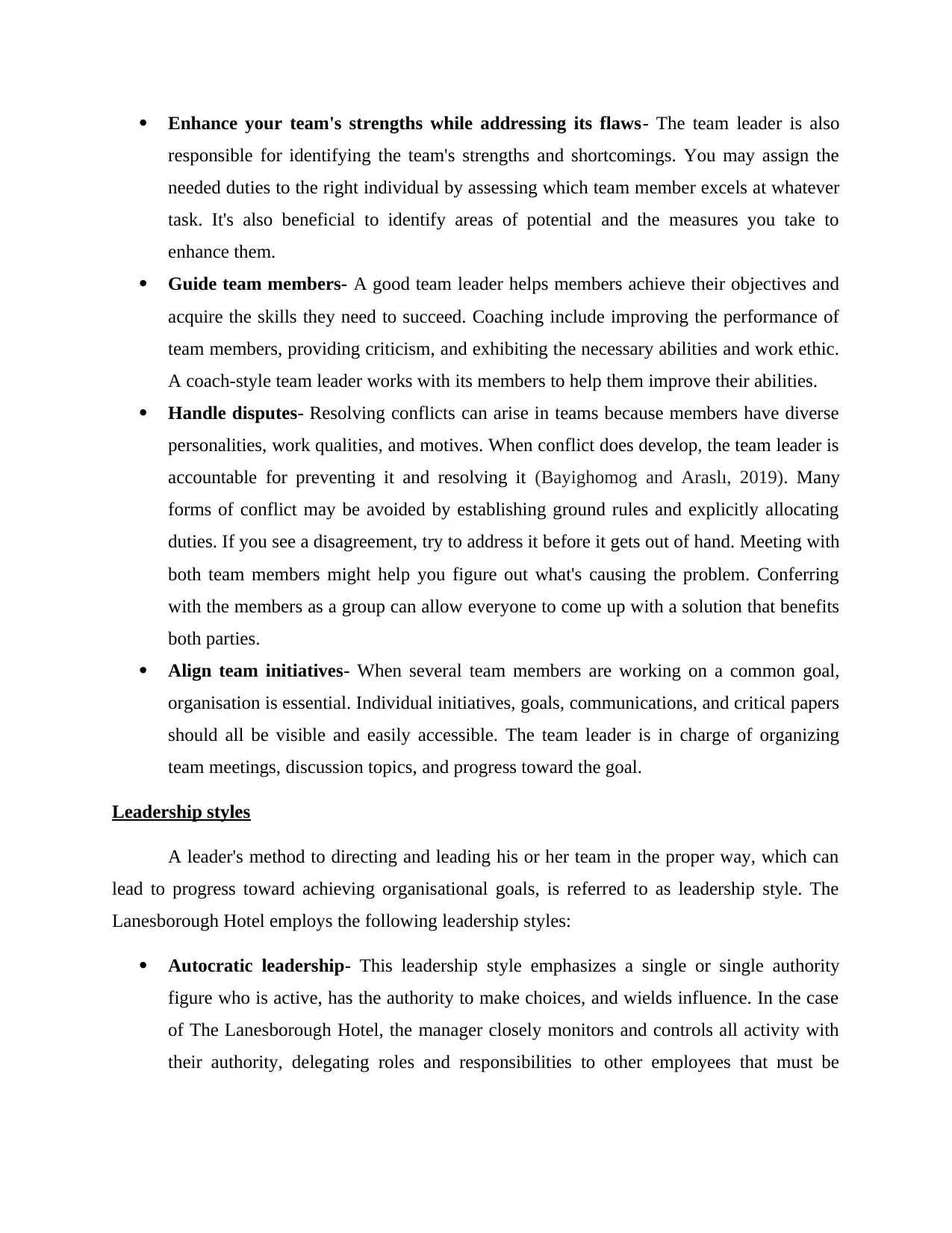
Enhance your team's strengths while addressing its flaws- The team leader is also
responsible for identifying the team's strengths and shortcomings. You may assign the
needed duties to the right individual by assessing which team member excels at whatever
task. It's also beneficial to identify areas of potential and the measures you take to
enhance them.
Guide team members- A good team leader helps members achieve their objectives and
acquire the skills they need to succeed. Coaching include improving the performance of
team members, providing criticism, and exhibiting the necessary abilities and work ethic.
A coach-style team leader works with its members to help them improve their abilities.
Handle disputes- Resolving conflicts can arise in teams because members have diverse
personalities, work qualities, and motives. When conflict does develop, the team leader is
accountable for preventing it and resolving it (Bayighomog and Araslı, 2019). Many
forms of conflict may be avoided by establishing ground rules and explicitly allocating
duties. If you see a disagreement, try to address it before it gets out of hand. Meeting with
both team members might help you figure out what's causing the problem. Conferring
with the members as a group can allow everyone to come up with a solution that benefits
both parties.
Align team initiatives- When several team members are working on a common goal,
organisation is essential. Individual initiatives, goals, communications, and critical papers
should all be visible and easily accessible. The team leader is in charge of organizing
team meetings, discussion topics, and progress toward the goal.
Leadership styles
A leader's method to directing and leading his or her team in the proper way, which can
lead to progress toward achieving organisational goals, is referred to as leadership style. The
Lanesborough Hotel employs the following leadership styles:
Autocratic leadership- This leadership style emphasizes a single or single authority
figure who is active, has the authority to make choices, and wields influence. In the case
of The Lanesborough Hotel, the manager closely monitors and controls all activity with
their authority, delegating roles and responsibilities to other employees that must be
responsible for identifying the team's strengths and shortcomings. You may assign the
needed duties to the right individual by assessing which team member excels at whatever
task. It's also beneficial to identify areas of potential and the measures you take to
enhance them.
Guide team members- A good team leader helps members achieve their objectives and
acquire the skills they need to succeed. Coaching include improving the performance of
team members, providing criticism, and exhibiting the necessary abilities and work ethic.
A coach-style team leader works with its members to help them improve their abilities.
Handle disputes- Resolving conflicts can arise in teams because members have diverse
personalities, work qualities, and motives. When conflict does develop, the team leader is
accountable for preventing it and resolving it (Bayighomog and Araslı, 2019). Many
forms of conflict may be avoided by establishing ground rules and explicitly allocating
duties. If you see a disagreement, try to address it before it gets out of hand. Meeting with
both team members might help you figure out what's causing the problem. Conferring
with the members as a group can allow everyone to come up with a solution that benefits
both parties.
Align team initiatives- When several team members are working on a common goal,
organisation is essential. Individual initiatives, goals, communications, and critical papers
should all be visible and easily accessible. The team leader is in charge of organizing
team meetings, discussion topics, and progress toward the goal.
Leadership styles
A leader's method to directing and leading his or her team in the proper way, which can
lead to progress toward achieving organisational goals, is referred to as leadership style. The
Lanesborough Hotel employs the following leadership styles:
Autocratic leadership- This leadership style emphasizes a single or single authority
figure who is active, has the authority to make choices, and wields influence. In the case
of The Lanesborough Hotel, the manager closely monitors and controls all activity with
their authority, delegating roles and responsibilities to other employees that must be
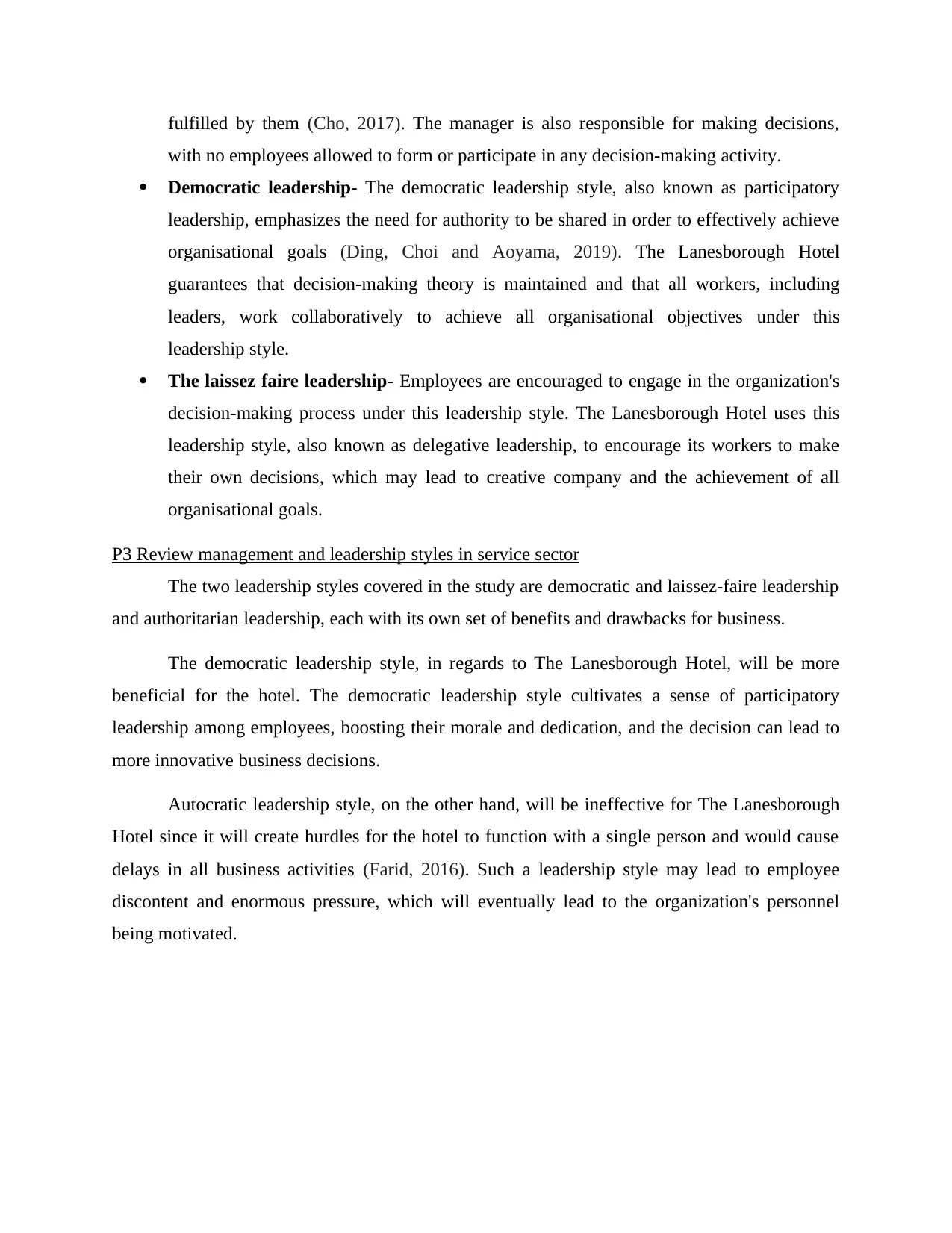
fulfilled by them (Cho, 2017). The manager is also responsible for making decisions,
with no employees allowed to form or participate in any decision-making activity.
Democratic leadership- The democratic leadership style, also known as participatory
leadership, emphasizes the need for authority to be shared in order to effectively achieve
organisational goals (Ding, Choi and Aoyama, 2019). The Lanesborough Hotel
guarantees that decision-making theory is maintained and that all workers, including
leaders, work collaboratively to achieve all organisational objectives under this
leadership style.
The laissez faire leadership- Employees are encouraged to engage in the organization's
decision-making process under this leadership style. The Lanesborough Hotel uses this
leadership style, also known as delegative leadership, to encourage its workers to make
their own decisions, which may lead to creative company and the achievement of all
organisational goals.
P3 Review management and leadership styles in service sector
The two leadership styles covered in the study are democratic and laissez-faire leadership
and authoritarian leadership, each with its own set of benefits and drawbacks for business.
The democratic leadership style, in regards to The Lanesborough Hotel, will be more
beneficial for the hotel. The democratic leadership style cultivates a sense of participatory
leadership among employees, boosting their morale and dedication, and the decision can lead to
more innovative business decisions.
Autocratic leadership style, on the other hand, will be ineffective for The Lanesborough
Hotel since it will create hurdles for the hotel to function with a single person and would cause
delays in all business activities (Farid, 2016). Such a leadership style may lead to employee
discontent and enormous pressure, which will eventually lead to the organization's personnel
being motivated.
with no employees allowed to form or participate in any decision-making activity.
Democratic leadership- The democratic leadership style, also known as participatory
leadership, emphasizes the need for authority to be shared in order to effectively achieve
organisational goals (Ding, Choi and Aoyama, 2019). The Lanesborough Hotel
guarantees that decision-making theory is maintained and that all workers, including
leaders, work collaboratively to achieve all organisational objectives under this
leadership style.
The laissez faire leadership- Employees are encouraged to engage in the organization's
decision-making process under this leadership style. The Lanesborough Hotel uses this
leadership style, also known as delegative leadership, to encourage its workers to make
their own decisions, which may lead to creative company and the achievement of all
organisational goals.
P3 Review management and leadership styles in service sector
The two leadership styles covered in the study are democratic and laissez-faire leadership
and authoritarian leadership, each with its own set of benefits and drawbacks for business.
The democratic leadership style, in regards to The Lanesborough Hotel, will be more
beneficial for the hotel. The democratic leadership style cultivates a sense of participatory
leadership among employees, boosting their morale and dedication, and the decision can lead to
more innovative business decisions.
Autocratic leadership style, on the other hand, will be ineffective for The Lanesborough
Hotel since it will create hurdles for the hotel to function with a single person and would cause
delays in all business activities (Farid, 2016). Such a leadership style may lead to employee
discontent and enormous pressure, which will eventually lead to the organization's personnel
being motivated.
⊘ This is a preview!⊘
Do you want full access?
Subscribe today to unlock all pages.

Trusted by 1+ million students worldwide
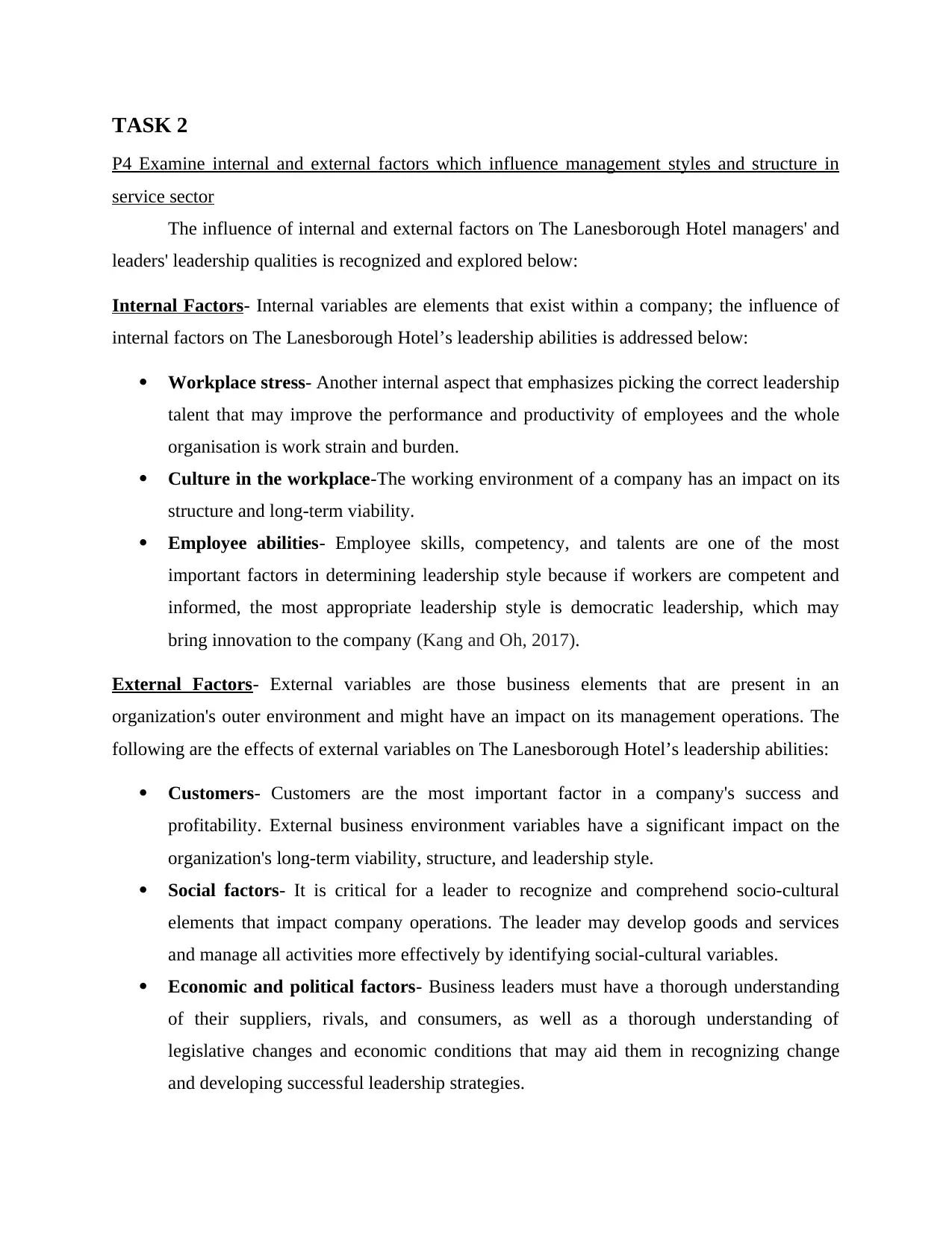
TASK 2
P4 Examine internal and external factors which influence management styles and structure in
service sector
The influence of internal and external factors on The Lanesborough Hotel managers' and
leaders' leadership qualities is recognized and explored below:
Internal Factors- Internal variables are elements that exist within a company; the influence of
internal factors on The Lanesborough Hotel’s leadership abilities is addressed below:
Workplace stress- Another internal aspect that emphasizes picking the correct leadership
talent that may improve the performance and productivity of employees and the whole
organisation is work strain and burden.
Culture in the workplace-The working environment of a company has an impact on its
structure and long-term viability.
Employee abilities- Employee skills, competency, and talents are one of the most
important factors in determining leadership style because if workers are competent and
informed, the most appropriate leadership style is democratic leadership, which may
bring innovation to the company (Kang and Oh, 2017).
External Factors- External variables are those business elements that are present in an
organization's outer environment and might have an impact on its management operations. The
following are the effects of external variables on The Lanesborough Hotel’s leadership abilities:
Customers- Customers are the most important factor in a company's success and
profitability. External business environment variables have a significant impact on the
organization's long-term viability, structure, and leadership style.
Social factors- It is critical for a leader to recognize and comprehend socio-cultural
elements that impact company operations. The leader may develop goods and services
and manage all activities more effectively by identifying social-cultural variables.
Economic and political factors- Business leaders must have a thorough understanding
of their suppliers, rivals, and consumers, as well as a thorough understanding of
legislative changes and economic conditions that may aid them in recognizing change
and developing successful leadership strategies.
P4 Examine internal and external factors which influence management styles and structure in
service sector
The influence of internal and external factors on The Lanesborough Hotel managers' and
leaders' leadership qualities is recognized and explored below:
Internal Factors- Internal variables are elements that exist within a company; the influence of
internal factors on The Lanesborough Hotel’s leadership abilities is addressed below:
Workplace stress- Another internal aspect that emphasizes picking the correct leadership
talent that may improve the performance and productivity of employees and the whole
organisation is work strain and burden.
Culture in the workplace-The working environment of a company has an impact on its
structure and long-term viability.
Employee abilities- Employee skills, competency, and talents are one of the most
important factors in determining leadership style because if workers are competent and
informed, the most appropriate leadership style is democratic leadership, which may
bring innovation to the company (Kang and Oh, 2017).
External Factors- External variables are those business elements that are present in an
organization's outer environment and might have an impact on its management operations. The
following are the effects of external variables on The Lanesborough Hotel’s leadership abilities:
Customers- Customers are the most important factor in a company's success and
profitability. External business environment variables have a significant impact on the
organization's long-term viability, structure, and leadership style.
Social factors- It is critical for a leader to recognize and comprehend socio-cultural
elements that impact company operations. The leader may develop goods and services
and manage all activities more effectively by identifying social-cultural variables.
Economic and political factors- Business leaders must have a thorough understanding
of their suppliers, rivals, and consumers, as well as a thorough understanding of
legislative changes and economic conditions that may aid them in recognizing change
and developing successful leadership strategies.
Paraphrase This Document
Need a fresh take? Get an instant paraphrase of this document with our AI Paraphraser
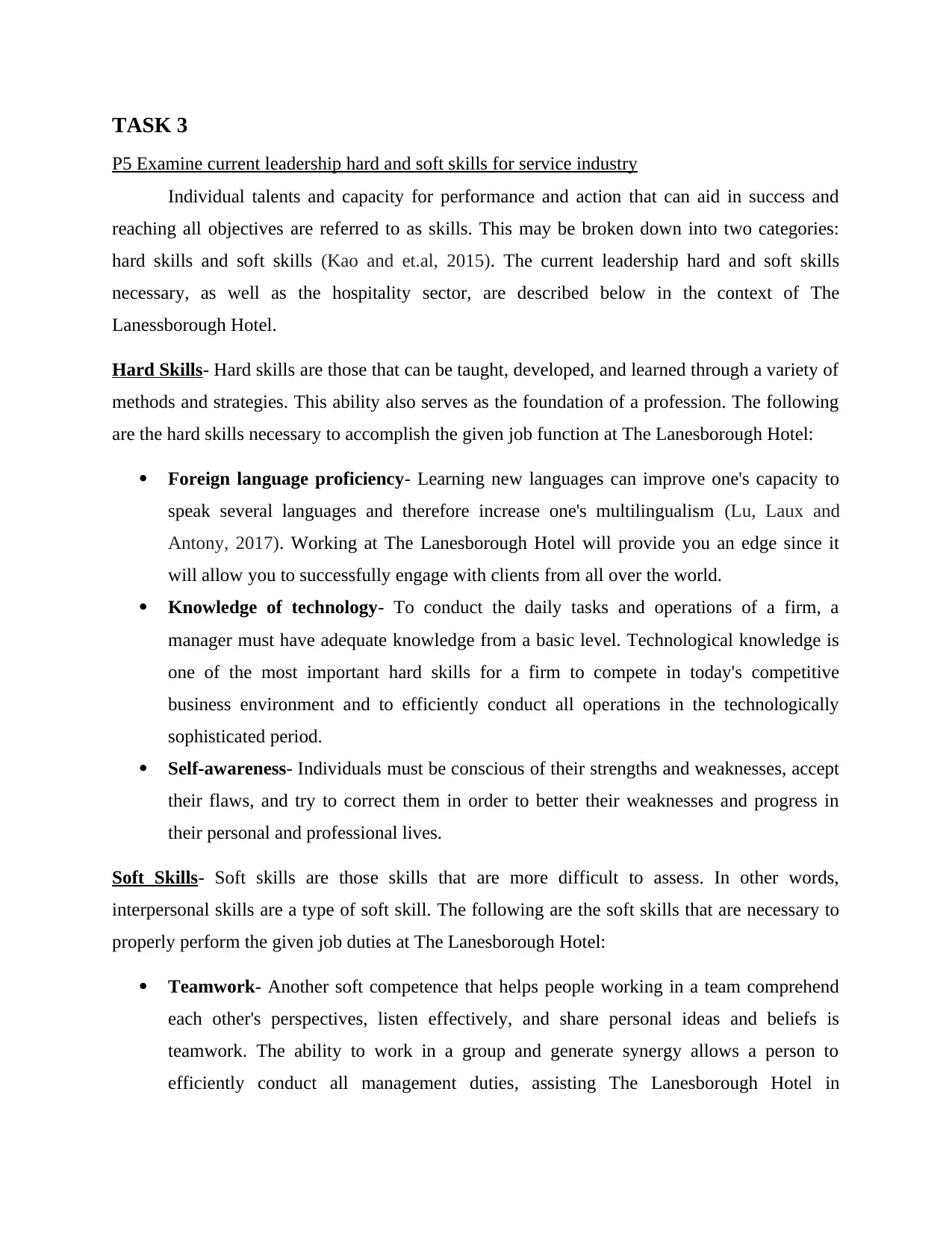
TASK 3
P5 Examine current leadership hard and soft skills for service industry
Individual talents and capacity for performance and action that can aid in success and
reaching all objectives are referred to as skills. This may be broken down into two categories:
hard skills and soft skills (Kao and et.al, 2015). The current leadership hard and soft skills
necessary, as well as the hospitality sector, are described below in the context of The
Lanessborough Hotel.
Hard Skills- Hard skills are those that can be taught, developed, and learned through a variety of
methods and strategies. This ability also serves as the foundation of a profession. The following
are the hard skills necessary to accomplish the given job function at The Lanesborough Hotel:
Foreign language proficiency- Learning new languages can improve one's capacity to
speak several languages and therefore increase one's multilingualism (Lu, Laux and
Antony, 2017). Working at The Lanesborough Hotel will provide you an edge since it
will allow you to successfully engage with clients from all over the world.
Knowledge of technology- To conduct the daily tasks and operations of a firm, a
manager must have adequate knowledge from a basic level. Technological knowledge is
one of the most important hard skills for a firm to compete in today's competitive
business environment and to efficiently conduct all operations in the technologically
sophisticated period.
Self-awareness- Individuals must be conscious of their strengths and weaknesses, accept
their flaws, and try to correct them in order to better their weaknesses and progress in
their personal and professional lives.
Soft Skills- Soft skills are those skills that are more difficult to assess. In other words,
interpersonal skills are a type of soft skill. The following are the soft skills that are necessary to
properly perform the given job duties at The Lanesborough Hotel:
Teamwork- Another soft competence that helps people working in a team comprehend
each other's perspectives, listen effectively, and share personal ideas and beliefs is
teamwork. The ability to work in a group and generate synergy allows a person to
efficiently conduct all management duties, assisting The Lanesborough Hotel in
P5 Examine current leadership hard and soft skills for service industry
Individual talents and capacity for performance and action that can aid in success and
reaching all objectives are referred to as skills. This may be broken down into two categories:
hard skills and soft skills (Kao and et.al, 2015). The current leadership hard and soft skills
necessary, as well as the hospitality sector, are described below in the context of The
Lanessborough Hotel.
Hard Skills- Hard skills are those that can be taught, developed, and learned through a variety of
methods and strategies. This ability also serves as the foundation of a profession. The following
are the hard skills necessary to accomplish the given job function at The Lanesborough Hotel:
Foreign language proficiency- Learning new languages can improve one's capacity to
speak several languages and therefore increase one's multilingualism (Lu, Laux and
Antony, 2017). Working at The Lanesborough Hotel will provide you an edge since it
will allow you to successfully engage with clients from all over the world.
Knowledge of technology- To conduct the daily tasks and operations of a firm, a
manager must have adequate knowledge from a basic level. Technological knowledge is
one of the most important hard skills for a firm to compete in today's competitive
business environment and to efficiently conduct all operations in the technologically
sophisticated period.
Self-awareness- Individuals must be conscious of their strengths and weaknesses, accept
their flaws, and try to correct them in order to better their weaknesses and progress in
their personal and professional lives.
Soft Skills- Soft skills are those skills that are more difficult to assess. In other words,
interpersonal skills are a type of soft skill. The following are the soft skills that are necessary to
properly perform the given job duties at The Lanesborough Hotel:
Teamwork- Another soft competence that helps people working in a team comprehend
each other's perspectives, listen effectively, and share personal ideas and beliefs is
teamwork. The ability to work in a group and generate synergy allows a person to
efficiently conduct all management duties, assisting The Lanesborough Hotel in
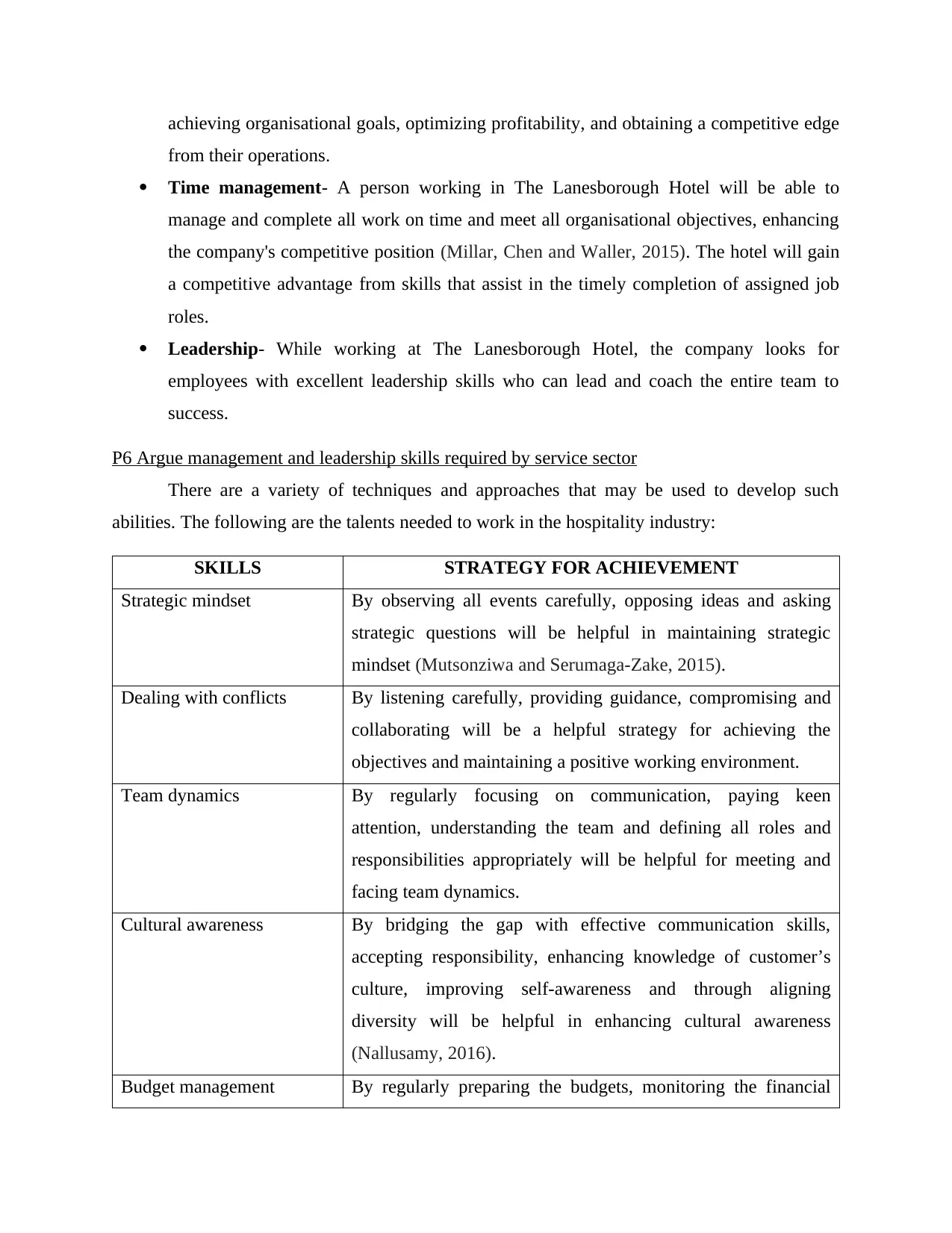
achieving organisational goals, optimizing profitability, and obtaining a competitive edge
from their operations.
Time management- A person working in The Lanesborough Hotel will be able to
manage and complete all work on time and meet all organisational objectives, enhancing
the company's competitive position (Millar, Chen and Waller, 2015). The hotel will gain
a competitive advantage from skills that assist in the timely completion of assigned job
roles.
Leadership- While working at The Lanesborough Hotel, the company looks for
employees with excellent leadership skills who can lead and coach the entire team to
success.
P6 Argue management and leadership skills required by service sector
There are a variety of techniques and approaches that may be used to develop such
abilities. The following are the talents needed to work in the hospitality industry:
SKILLS STRATEGY FOR ACHIEVEMENT
Strategic mindset By observing all events carefully, opposing ideas and asking
strategic questions will be helpful in maintaining strategic
mindset (Mutsonziwa and Serumaga-Zake, 2015).
Dealing with conflicts By listening carefully, providing guidance, compromising and
collaborating will be a helpful strategy for achieving the
objectives and maintaining a positive working environment.
Team dynamics By regularly focusing on communication, paying keen
attention, understanding the team and defining all roles and
responsibilities appropriately will be helpful for meeting and
facing team dynamics.
Cultural awareness By bridging the gap with effective communication skills,
accepting responsibility, enhancing knowledge of customer’s
culture, improving self-awareness and through aligning
diversity will be helpful in enhancing cultural awareness
(Nallusamy, 2016).
Budget management By regularly preparing the budgets, monitoring the financial
from their operations.
Time management- A person working in The Lanesborough Hotel will be able to
manage and complete all work on time and meet all organisational objectives, enhancing
the company's competitive position (Millar, Chen and Waller, 2015). The hotel will gain
a competitive advantage from skills that assist in the timely completion of assigned job
roles.
Leadership- While working at The Lanesborough Hotel, the company looks for
employees with excellent leadership skills who can lead and coach the entire team to
success.
P6 Argue management and leadership skills required by service sector
There are a variety of techniques and approaches that may be used to develop such
abilities. The following are the talents needed to work in the hospitality industry:
SKILLS STRATEGY FOR ACHIEVEMENT
Strategic mindset By observing all events carefully, opposing ideas and asking
strategic questions will be helpful in maintaining strategic
mindset (Mutsonziwa and Serumaga-Zake, 2015).
Dealing with conflicts By listening carefully, providing guidance, compromising and
collaborating will be a helpful strategy for achieving the
objectives and maintaining a positive working environment.
Team dynamics By regularly focusing on communication, paying keen
attention, understanding the team and defining all roles and
responsibilities appropriately will be helpful for meeting and
facing team dynamics.
Cultural awareness By bridging the gap with effective communication skills,
accepting responsibility, enhancing knowledge of customer’s
culture, improving self-awareness and through aligning
diversity will be helpful in enhancing cultural awareness
(Nallusamy, 2016).
Budget management By regularly preparing the budgets, monitoring the financial
⊘ This is a preview!⊘
Do you want full access?
Subscribe today to unlock all pages.

Trusted by 1+ million students worldwide
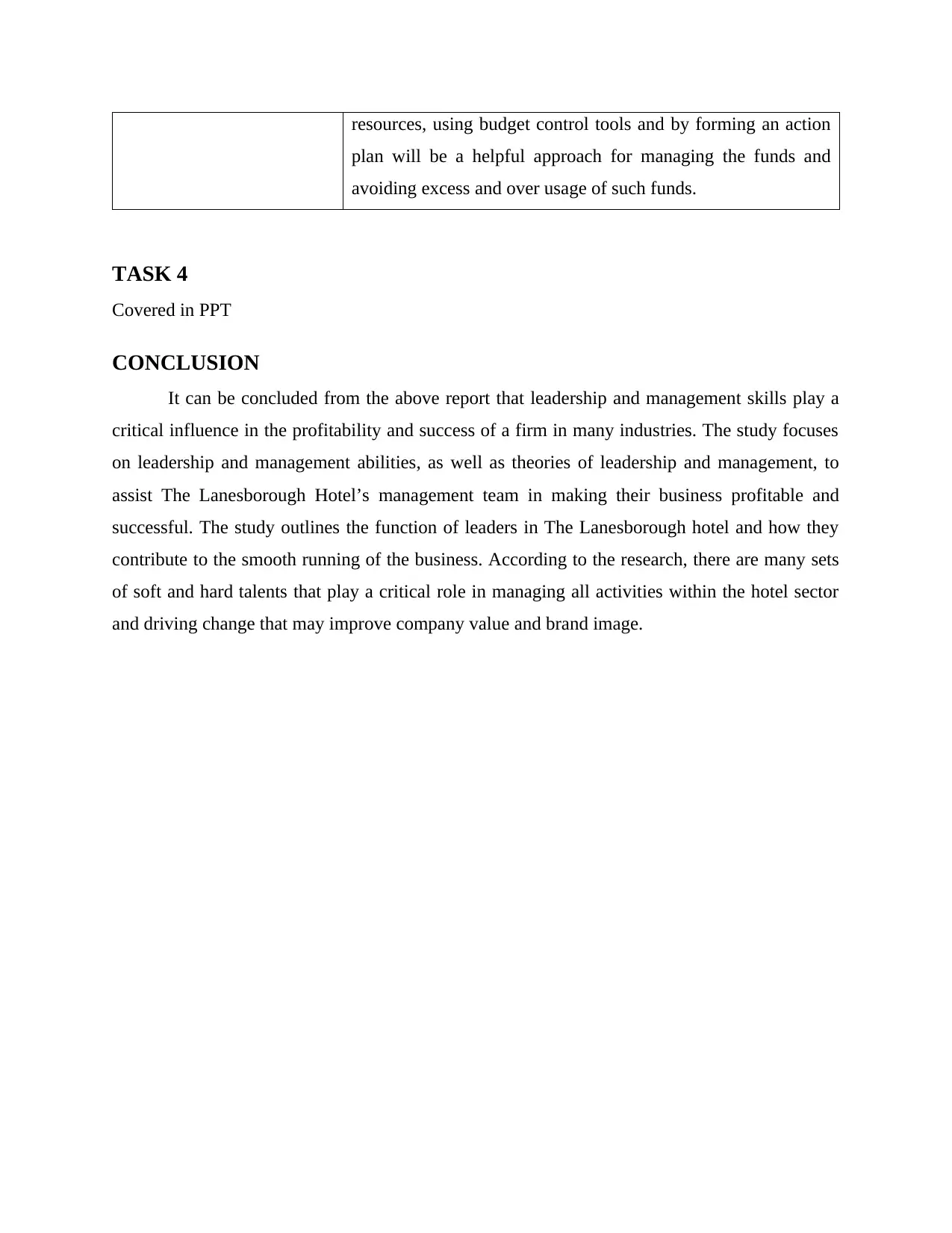
resources, using budget control tools and by forming an action
plan will be a helpful approach for managing the funds and
avoiding excess and over usage of such funds.
TASK 4
Covered in PPT
CONCLUSION
It can be concluded from the above report that leadership and management skills play a
critical influence in the profitability and success of a firm in many industries. The study focuses
on leadership and management abilities, as well as theories of leadership and management, to
assist The Lanesborough Hotel’s management team in making their business profitable and
successful. The study outlines the function of leaders in The Lanesborough hotel and how they
contribute to the smooth running of the business. According to the research, there are many sets
of soft and hard talents that play a critical role in managing all activities within the hotel sector
and driving change that may improve company value and brand image.
plan will be a helpful approach for managing the funds and
avoiding excess and over usage of such funds.
TASK 4
Covered in PPT
CONCLUSION
It can be concluded from the above report that leadership and management skills play a
critical influence in the profitability and success of a firm in many industries. The study focuses
on leadership and management abilities, as well as theories of leadership and management, to
assist The Lanesborough Hotel’s management team in making their business profitable and
successful. The study outlines the function of leaders in The Lanesborough hotel and how they
contribute to the smooth running of the business. According to the research, there are many sets
of soft and hard talents that play a critical role in managing all activities within the hotel sector
and driving change that may improve company value and brand image.
Paraphrase This Document
Need a fresh take? Get an instant paraphrase of this document with our AI Paraphraser
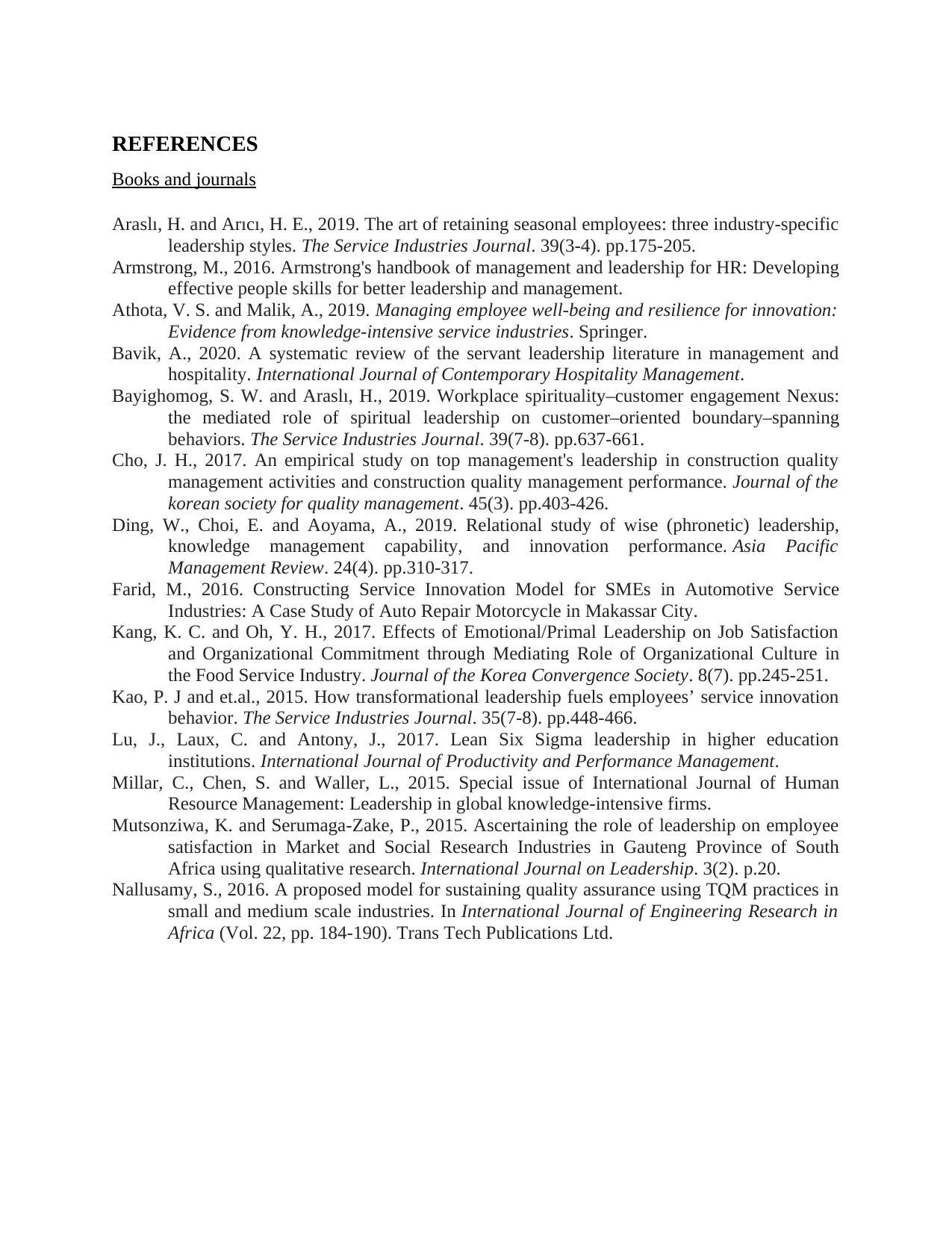
REFERENCES
Books and journals
Araslı, H. and Arıcı, H. E., 2019. The art of retaining seasonal employees: three industry-specific
leadership styles. The Service Industries Journal. 39(3-4). pp.175-205.
Armstrong, M., 2016. Armstrong's handbook of management and leadership for HR: Developing
effective people skills for better leadership and management.
Athota, V. S. and Malik, A., 2019. Managing employee well-being and resilience for innovation:
Evidence from knowledge-intensive service industries. Springer.
Bavik, A., 2020. A systematic review of the servant leadership literature in management and
hospitality. International Journal of Contemporary Hospitality Management.
Bayighomog, S. W. and Araslı, H., 2019. Workplace spirituality–customer engagement Nexus:
the mediated role of spiritual leadership on customer–oriented boundary–spanning
behaviors. The Service Industries Journal. 39(7-8). pp.637-661.
Cho, J. H., 2017. An empirical study on top management's leadership in construction quality
management activities and construction quality management performance. Journal of the
korean society for quality management. 45(3). pp.403-426.
Ding, W., Choi, E. and Aoyama, A., 2019. Relational study of wise (phronetic) leadership,
knowledge management capability, and innovation performance. Asia Pacific
Management Review. 24(4). pp.310-317.
Farid, M., 2016. Constructing Service Innovation Model for SMEs in Automotive Service
Industries: A Case Study of Auto Repair Motorcycle in Makassar City.
Kang, K. C. and Oh, Y. H., 2017. Effects of Emotional/Primal Leadership on Job Satisfaction
and Organizational Commitment through Mediating Role of Organizational Culture in
the Food Service Industry. Journal of the Korea Convergence Society. 8(7). pp.245-251.
Kao, P. J and et.al., 2015. How transformational leadership fuels employees’ service innovation
behavior. The Service Industries Journal. 35(7-8). pp.448-466.
Lu, J., Laux, C. and Antony, J., 2017. Lean Six Sigma leadership in higher education
institutions. International Journal of Productivity and Performance Management.
Millar, C., Chen, S. and Waller, L., 2015. Special issue of International Journal of Human
Resource Management: Leadership in global knowledge-intensive firms.
Mutsonziwa, K. and Serumaga-Zake, P., 2015. Ascertaining the role of leadership on employee
satisfaction in Market and Social Research Industries in Gauteng Province of South
Africa using qualitative research. International Journal on Leadership. 3(2). p.20.
Nallusamy, S., 2016. A proposed model for sustaining quality assurance using TQM practices in
small and medium scale industries. In International Journal of Engineering Research in
Africa (Vol. 22, pp. 184-190). Trans Tech Publications Ltd.
Books and journals
Araslı, H. and Arıcı, H. E., 2019. The art of retaining seasonal employees: three industry-specific
leadership styles. The Service Industries Journal. 39(3-4). pp.175-205.
Armstrong, M., 2016. Armstrong's handbook of management and leadership for HR: Developing
effective people skills for better leadership and management.
Athota, V. S. and Malik, A., 2019. Managing employee well-being and resilience for innovation:
Evidence from knowledge-intensive service industries. Springer.
Bavik, A., 2020. A systematic review of the servant leadership literature in management and
hospitality. International Journal of Contemporary Hospitality Management.
Bayighomog, S. W. and Araslı, H., 2019. Workplace spirituality–customer engagement Nexus:
the mediated role of spiritual leadership on customer–oriented boundary–spanning
behaviors. The Service Industries Journal. 39(7-8). pp.637-661.
Cho, J. H., 2017. An empirical study on top management's leadership in construction quality
management activities and construction quality management performance. Journal of the
korean society for quality management. 45(3). pp.403-426.
Ding, W., Choi, E. and Aoyama, A., 2019. Relational study of wise (phronetic) leadership,
knowledge management capability, and innovation performance. Asia Pacific
Management Review. 24(4). pp.310-317.
Farid, M., 2016. Constructing Service Innovation Model for SMEs in Automotive Service
Industries: A Case Study of Auto Repair Motorcycle in Makassar City.
Kang, K. C. and Oh, Y. H., 2017. Effects of Emotional/Primal Leadership on Job Satisfaction
and Organizational Commitment through Mediating Role of Organizational Culture in
the Food Service Industry. Journal of the Korea Convergence Society. 8(7). pp.245-251.
Kao, P. J and et.al., 2015. How transformational leadership fuels employees’ service innovation
behavior. The Service Industries Journal. 35(7-8). pp.448-466.
Lu, J., Laux, C. and Antony, J., 2017. Lean Six Sigma leadership in higher education
institutions. International Journal of Productivity and Performance Management.
Millar, C., Chen, S. and Waller, L., 2015. Special issue of International Journal of Human
Resource Management: Leadership in global knowledge-intensive firms.
Mutsonziwa, K. and Serumaga-Zake, P., 2015. Ascertaining the role of leadership on employee
satisfaction in Market and Social Research Industries in Gauteng Province of South
Africa using qualitative research. International Journal on Leadership. 3(2). p.20.
Nallusamy, S., 2016. A proposed model for sustaining quality assurance using TQM practices in
small and medium scale industries. In International Journal of Engineering Research in
Africa (Vol. 22, pp. 184-190). Trans Tech Publications Ltd.
1 out of 11
Related Documents
Your All-in-One AI-Powered Toolkit for Academic Success.
+13062052269
info@desklib.com
Available 24*7 on WhatsApp / Email
![[object Object]](/_next/static/media/star-bottom.7253800d.svg)
Unlock your academic potential
Copyright © 2020–2025 A2Z Services. All Rights Reserved. Developed and managed by ZUCOL.




